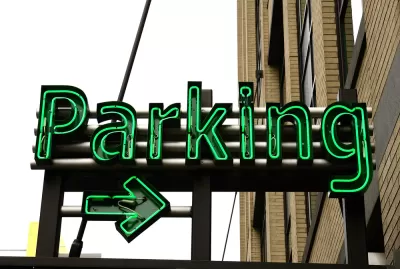Dynamic pricing is not the only route to increasing parking availability. Better management of disabled placards at metered spaces may be an easier and more effective strategy. Implemented on July 1, Portland's policy is showing dramatic results.

The new policy is simple: owners of disabled parking placards are treated like non-disabled motorists, i.e. pay to park, though they can park for a longer period. The one exception to the payment policy is for wheelchair users who are distinguished by a different type of placard. [See time chart and placard distinction on the Portland Bureau of Transportation website.]
Steven DuBois of the Associated Press explains that what drove Portland to make the policy change was the lack of available parking and the disproportionate number of disabled parking placards occupying downtown spaces.
An AP survey on Thursday (July 10) and Friday afternoon found over 50% parking vacancy on a busy downtown street. When they surveyed the street last year, parking vacancy was zero. AP was not the only one to notice the dramatic change.
"I was amazed on July 1," parking code enforcement officer Becky Rhodes said. "I thought there would be more of a transition period, but people just stopped. They were gone."
Perhaps the publicity on the policy change accounts for the sudden parking availability. Notices were placed on vehicles displaying disabled placards informing them of the new policy prior to the change.
Portland is not the first to do away with the handicapped placard privilege. Philadelphia and Raleigh, North Carolina already do it, writes DuBois.
For an interesting policy discussion on the merits of considering this policy change, the University of California Transportation Center released their report last year by Michael Manville and Jonathan Williams, accessible here.
"Manville and Williams aren't arguing that we should abolish disabled parking all together. Rather, they argue that there's no good reason to make it free, and plenty of reasons not to."
Actual reports on how the Portland policy change affects parking availability is expected in the fall after the city surveys all downtown parking spaces.
If those with non-wheelchair, disabled person placards fail to pay the meter or observe their extended time limits, they are subject to the same $60 violation that others must pay, writes DuBois.
DuBois doesn't mention whether the policy change was influenced by parking revenue considerations.
FULL STORY: Portland parking eases; free disabled parking ends

Planetizen Federal Action Tracker
A weekly monitor of how Trump’s orders and actions are impacting planners and planning in America.

San Francisco's School District Spent $105M To Build Affordable Housing for Teachers — And That's Just the Beginning
SFUSD joins a growing list of school districts using their land holdings to address housing affordability challenges faced by their own employees.

The Tiny, Adorable $7,000 Car Turning Japan Onto EVs
The single seat Mibot charges from a regular plug as quickly as an iPad, and is about half the price of an average EV.

Seattle's Plan for Adopting Driverless Cars
Equity, safety, accessibility and affordability are front of mind as the city prepares for robotaxis and other autonomous vehicles.

As Trump Phases Out FEMA, Is It Time to Flee the Floodplains?
With less federal funding available for disaster relief efforts, the need to relocate at-risk communities is more urgent than ever.

With Protected Lanes, 460% More People Commute by Bike
For those needing more ammo, more data proving what we already knew is here.
Urban Design for Planners 1: Software Tools
This six-course series explores essential urban design concepts using open source software and equips planners with the tools they need to participate fully in the urban design process.
Planning for Universal Design
Learn the tools for implementing Universal Design in planning regulations.
Smith Gee Studio
City of Charlotte
City of Camden Redevelopment Agency
City of Astoria
Transportation Research & Education Center (TREC) at Portland State University
US High Speed Rail Association
City of Camden Redevelopment Agency
Municipality of Princeton (NJ)



























